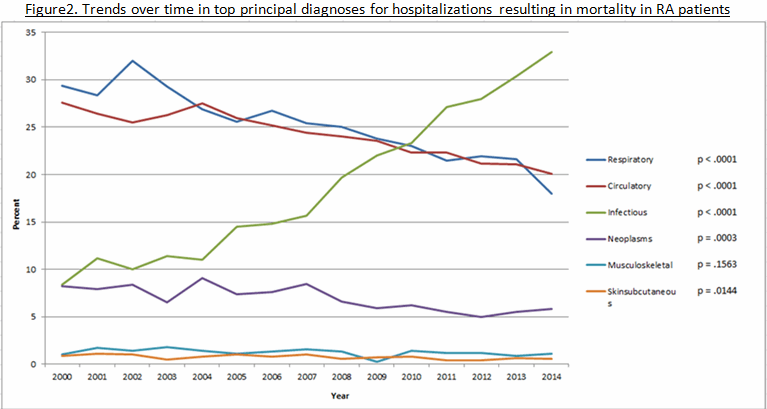Session Information
Session Type: ACR Poster Session A
Session Time: 9:00AM-11:00AM
Background/Purpose: Over the past two decades, major advances have been made in the treatment of RA, allowing disease remission to become an achievable goal. Although studies have looked at the trends in hospitalization for RA, contemporary data on the principal diagnoses that lead to hospitalizations and in-hospital mortality in RA are lacking. The objective of this study was to evaluate national trends in hospitalizations, underlying causes, and in-hospital mortality in RA over the past 15 years.
Methods: We used the National Inpatient Sample (NIS) from 2000-2014 to study the temporal trends in RA hospitalizations in the US. All hospitalized adults with RA (ICD9-CM 714.0 and 714.2) were included. We examined trends over time using linear regression in SAS version 9.3.
Results: Between 2000 and 2014, there were 183,983 hospitalizations with a principal discharge diagnosis of RA. The annual rates of hospitalization for principal diagnosis of RA decreased from 76.5 admissions per 1 million adults in 2000 to 30 in 2014 (P<0.0001 for trend), an admission rate reduction of 61%. Although overall annual hospitalization rates declined in the US as well in this time frame- from 14.5% to 12% (rate reduction of 16%)- the decline was not as significant as in RA. In-hospital mortality declined from 0.70% of all hospitalizations in 2000 to 0.41% in 2014 (P<0.0001 for trend). The mean (±SD) age of hospitalized RA patients remained largely stable, 62.7 (±30.7) in 2000 and 61.9 (±32.3) years in 2014. When RA was listed as a non-primary diagnosis, the most frequent principal diagnoses for admission remained diseases of the circulatory system over the entire study period. However, the rates of hospitalization for RA patients for circulatory or respiratory system diseases significantly declined between 2000 and 2014, whereas hospitalization for infectious disease causes significantly increased (Figure 1). The most common principal diagnosis leading to in-hospital mortality changed from diseases of the respiratory system in 2000 to infectious and parasitic diseases in 2014 (Figure 2).
Conclusion: Both hospitalization rates and in-hospital mortality rates in U.S. patients with RA have declined significantly over the past 15 years. Diseases of the circulatory system continue to be the principal diagnosis associated with hospitalizations whereas infectious diseases account for the hospitalizations resulting in highest in-hospital mortality in RA in recent years.
To cite this abstract in AMA style:
Singh N, Gao Y, Field E, Lenert P, Curtis JR, Vaughan-Sarrazin M. U.S. Trends in Hospitalization Rates and Causes and in-Hospital Mortality in Rheumatoid Arthritis Patients, 2000-2014 [abstract]. Arthritis Rheumatol. 2018; 70 (suppl 9). https://acrabstracts.org/abstract/u-s-trends-in-hospitalization-rates-and-causes-and-in-hospital-mortality-in-rheumatoid-arthritis-patients-2000-2014/. Accessed .« Back to 2018 ACR/ARHP Annual Meeting
ACR Meeting Abstracts - https://acrabstracts.org/abstract/u-s-trends-in-hospitalization-rates-and-causes-and-in-hospital-mortality-in-rheumatoid-arthritis-patients-2000-2014/


